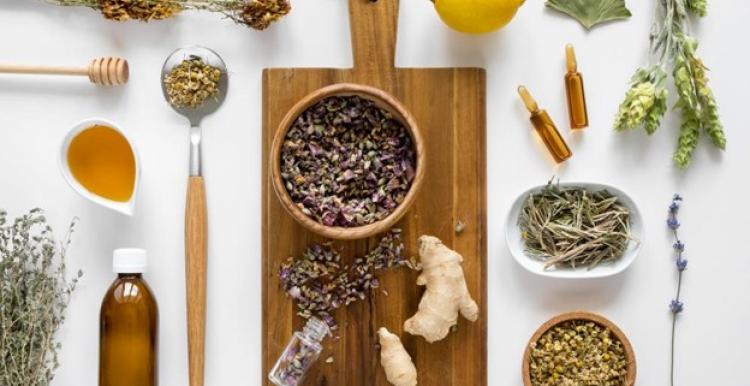The Evolving Role of Herbs in Managing Stress and Anxiety

Herbs, with their subtle power and ancient roots, are emerging as significant allies in the fight against the modern-day stress epidemic. This article, courtesy of Be My Spirit Guide.com, dives into herbal remedies as a natural method for finding solace and balance within our hectic lives. By intertwining traditional wisdom with the latest scientific findings, we uncover the potential of these natural wonders in fostering well-being and tranquility in our contemporary world.
Harness Nature's Potential for Calm
In our fast-paced world, the search for peace often leads us back to natural remedies — herbs. These plants are not only time-tested in traditional medicine but are also the focus of detailed scientific studies, underscoring their importance in today's health practices. This resurgence in herbal interest aligns with a growing appreciation for holistic approaches to wellness, where the mind, body, and environment are considered interconnected.
For instance, lemon balm is associated with better mood and mental performance, while ashwagandha is recognized for strengthening the body's ability to handle stress. Interestingly, these herbs not only provide immediate relief but may also offer long-term benefits by enhancing overall well-being.
Ongoing research is revealing that specific substances in these herbs, like rosmarinic acid in lemon balm and with anolides in ashwagandha, play a crucial role in reducing anxiety and promoting calmness, illustrating the profound impact of nature on human health.
The Science Enhancing Herbal Wisdom
Long-standing herbal traditions are gaining scientific substantiation, affirming their place in the management of stress and anxiety. The intricate dance of phytochemicals within these plants with our endocrine and nervous systems can lead to reduced cortisol levels and the stabilization of mood-enhancing neurotransmitters. This interaction suggests a natural, holistic approach to health, where plants may play a key role in nurturing both mental and physical well-being.
Researchers are untangling the complexities of herbal impacts on human health, revealing a sophisticated interaction that underscores the potential of these natural remedies. This growing body of evidence not only validates ancient practices but also opens new avenues for integrating these herbs into modern therapeutic strategies.
It's a promising convergence of age-old wisdom and contemporary science, offering hope for more effective and natural health solutions.
Embracing Plant-Based Allies in Healthcare
With the increasing validation from research and support from health practitioners, herbs like valerian and chamomile are gaining prominence in healthcare. The use of these herbs in various forms, such as dietary supplements, teas, or aromatherapy products, is becoming more widespread.
This trend highlights a growing shift towards blending natural remedies with traditional medical practices to form a more holistic approach to healthcare. Including herbs like valerian, known for its sleep-inducing properties, and chamomile, renowned for its calming effects, reflects a broader recognition of the role of natural therapies in promoting health and well-being.
Moreover, this movement towards integrating herbal treatments provides patients with more diverse and culturally sensitive healthcare options, potentially improving patient satisfaction and outcomes.
A Natural Spectrum of Calming Agents
In the pursuit of natural stress relief, a variety of plant-based options come to the forefront, including the likes of passionflower and lavender.
Passionflower is renowned for its potential to ease anxiety and improve sleep, offering a natural approach to relaxation. Lavender, a staple in aromatherapy, is celebrated for its soothing aroma and ability to enhance sleep quality and reduce stress. These botanicals signify a shift towards embracing nature's solutions for managing stress.
Among these natural agents, premium THCA flower also stands out for its wellness properties. THCA, or tetrahydrocannabinolic acid, is a non-psychoactive compound found in cannabis. It offers the benefits of cannabis without the psychoactive effects associated with THC, providing a subtle yet effective means of stress relief.
The inclusion of THCA in this spectrum underlines the increasing interest in exploring a wide range of botanicals for their calming effects, highlighting an alternative path to conventional stress relief methods.
Navigating Herbal Regulations
While herbal remedies present a promising frontier, it is crucial to navigate the regulatory landscape carefully. The quality, purity, and legality of herbs can vary significantly, necessitating a vigilant approach to selecting and using these products. This includes understanding the sources of the herbs, as well as any processing methods used, which can greatly affect their safety and efficacy.
Additionally, it's important to recognize that some herbs might interact with conventional medications, making it essential to consult healthcare professionals before use. Consumers are urged to educate themselves on national and regional regulations to ensure they are making informed decisions that align with legal standards and safety guidelines.
Awareness and adherence to these regulations not only protect consumers but also contribute to the responsible growth and acceptance of herbal medicine in mainstream healthcare.
Integrating Herbs into a Holistic Lifestyle
Incorporating herbs into stress management is most effective when combined with a holistic lifestyle approach. Balancing the use of herbs with other health-promoting practices such as nutrition, physical activity, and mindfulness techniques can enhance overall well-being.
Adopting such an integrative model positions herbs not as standalone cures but as part of a synergistic approach to health that may amplify their benefits. This approach encourages viewing health as a comprehensive journey, where various elements like emotional well-being and environmental factors also play a crucial role.
Furthermore, by integrating herbs into a broader health regimen, individuals can tailor their wellness practices to suit their unique needs and preferences, fostering a more personalized and sustainable approach to health and stress management.
The Power of Informed Choices in Herbal Use
Informed decision-making is the keystone of utilizing herbs responsibly. Access to educational resources and advocacy for continued research are critical to expanding the safe application of these botanicals.
This includes understanding not only the benefits but also the limitations and potential side effects of various herbs, thereby fostering a balanced perspective. Additionally, being informed about the sustainability and ethical sourcing of herbs is essential, as this impacts both the environment and the quality of the herbal products.
Through ongoing education, both consumers and health professionals can champion the prudent use of herbs, contributing to a well-informed community that benefits from the full potential of these natural remedies.
This collective wisdom not only enhances personal health but also supports the integrity and future development of herbal medicine.
Conclusion
The future holds a vision where the distinction between traditional herbal practices and contemporary medical treatments becomes increasingly blended. As every new piece of research adds depth to our understanding, we anticipate a healthcare landscape that more seamlessly integrates the benefits of herbal remedies. It's a future where the potential of plants to heal and soothe is fully recognized and valued as part of comprehensive health care.
This advice is brought to you in association with Be My Spirit Guide.com


